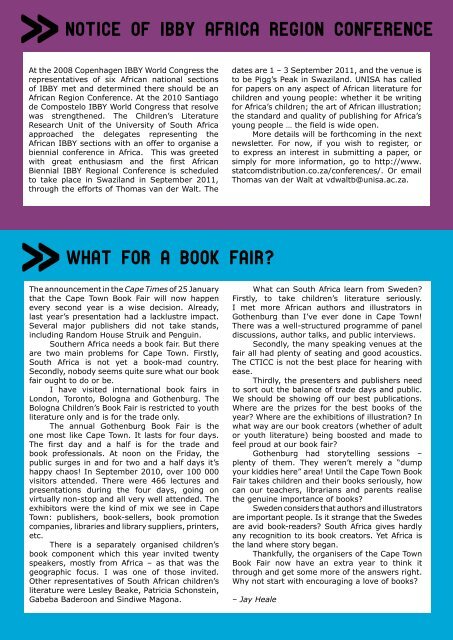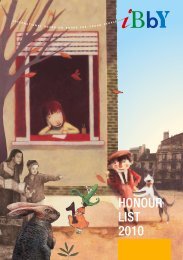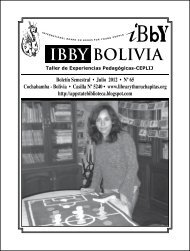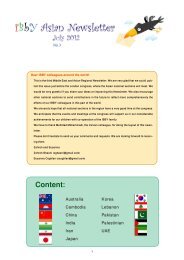Page 1 NEWSLETTER No. 63 MARCH 2011 email: info@ibbysa.org ...
Page 1 NEWSLETTER No. 63 MARCH 2011 email: info@ibbysa.org ...
Page 1 NEWSLETTER No. 63 MARCH 2011 email: info@ibbysa.org ...
Create successful ePaper yourself
Turn your PDF publications into a flip-book with our unique Google optimized e-Paper software.
<strong>No</strong>tice of IBBY Africa Region Conference<br />
At the 2008 Copenhagen IBBY World Congress the<br />
representatives of six African national sections<br />
of IBBY met and determined there should be an<br />
African Region Conference. At the 2010 Santiago<br />
de Compostelo IBBY World Congress that resolve<br />
was strengthened. The Children’s Literature<br />
Research Unit of the University of South Africa<br />
approached the delegates representing the<br />
African IBBY sections with an offer to <strong>org</strong>anise a<br />
biennial conference in Africa. This was greeted<br />
with great enthusiasm and the first African<br />
Biennial IBBY Regional Conference is scheduled<br />
to take place in Swaziland in September <strong>2011</strong>,<br />
through the efforts of Thomas van der Walt. The<br />
>> The announcement in the Cape Times of 25 January<br />
that the Cape Town Book Fair will now happen<br />
every second year is a wise decision. Already,<br />
last year’s presentation had a lacklustre impact.<br />
Several major publishers did not take stands,<br />
including Random House Struik and Penguin.<br />
Southern Africa needs a book fair. But there<br />
are two main problems for Cape Town. Firstly,<br />
South Africa is not yet a book-mad country.<br />
Secondly, nobody seems quite sure what our book<br />
fair ought to do or be.<br />
I have visited international book fairs in<br />
London, Toronto, Bologna and Gothenburg. The<br />
Bologna Children’s Book Fair is restricted to youth<br />
literature only and is for the trade only.<br />
The annual Gothenburg Book Fair is the<br />
one most like Cape Town. It lasts for four days.<br />
The first day and a half is for the trade and<br />
book professionals. At noon on the Friday, the<br />
public surges in and for two and a half days it’s<br />
happy chaos! In September 2010, over 100 000<br />
visitors attended. There were 466 lectures and<br />
presentations during the four days, going on<br />
virtually non-stop and all very well attended. The<br />
exhibitors were the kind of mix we see in Cape<br />
Town: publishers, book-sellers, book promotion<br />
companies, libraries and library suppliers, printers,<br />
etc.<br />
There is a separately <strong>org</strong>anised children’s<br />
book component which this year invited twenty<br />
speakers, mostly from Africa – as that was the<br />
geographic focus. I was one of those invited.<br />
Other representatives of South African children’s<br />
literature were Lesley Beake, Patricia Schonstein,<br />
Gabeba Baderoon and Sindiwe Magona.<br />
What for a Book Fair?<br />
dates are 1 – 3 September <strong>2011</strong>, and the venue is<br />
to be Pigg’s Peak in Swaziland. UNISA has called<br />
for papers on any aspect of African literature for<br />
children and young people: whether it be writing<br />
for Africa’s children; the art of African illustration;<br />
the standard and quality of publishing for Africa’s<br />
young people … the field is wide open.<br />
More details will be forthcoming in the next<br />
newsletter. For now, if you wish to register, or<br />
to express an interest in submitting a paper, or<br />
simply for more information, go to http://www.<br />
statcomdistribution.co.za/conferences/. Or <strong>email</strong><br />
Thomas van der Walt at vdwaltb@unisa.ac.za.<br />
What can South Africa learn from Sweden?<br />
Firstly, to take children’s literature seriously.<br />
I met more African authors and illustrators in<br />
Gothenburg than I’ve ever done in Cape Town!<br />
There was a well-structured programme of panel<br />
discussions, author talks, and public interviews.<br />
Secondly, the many speaking venues at the<br />
fair all had plenty of seating and good acoustics.<br />
The CTICC is not the best place for hearing with<br />
ease.<br />
Thirdly, the presenters and publishers need<br />
to sort out the balance of trade days and public.<br />
We should be showing off our best publications.<br />
Where are the prizes for the best books of the<br />
year? Where are the exhibitions of illustration? In<br />
what way are our book creators (whether of adult<br />
or youth literature) being boosted and made to<br />
feel proud at our book fair?<br />
Gothenburg had storytelling sessions –<br />
plenty of them. They weren’t merely a “dump<br />
your kiddies here” area! Until the Cape Town Book<br />
Fair takes children and their books seriously, how<br />
can our teachers, librarians and parents realise<br />
the genuine importance of books?<br />
Sweden considers that authors and illustrators<br />
are important people. Is it strange that the Swedes<br />
are avid book-readers? South Africa gives hardly<br />
any recognition to its book creators. Yet Africa is<br />
the land where story began.<br />
Thankfully, the <strong>org</strong>anisers of the Cape Town<br />
Book Fair now have an extra year to think it<br />
through and get some more of the answers right.<br />
Why not start with encouraging a love of books?<br />
– Jay Heale





